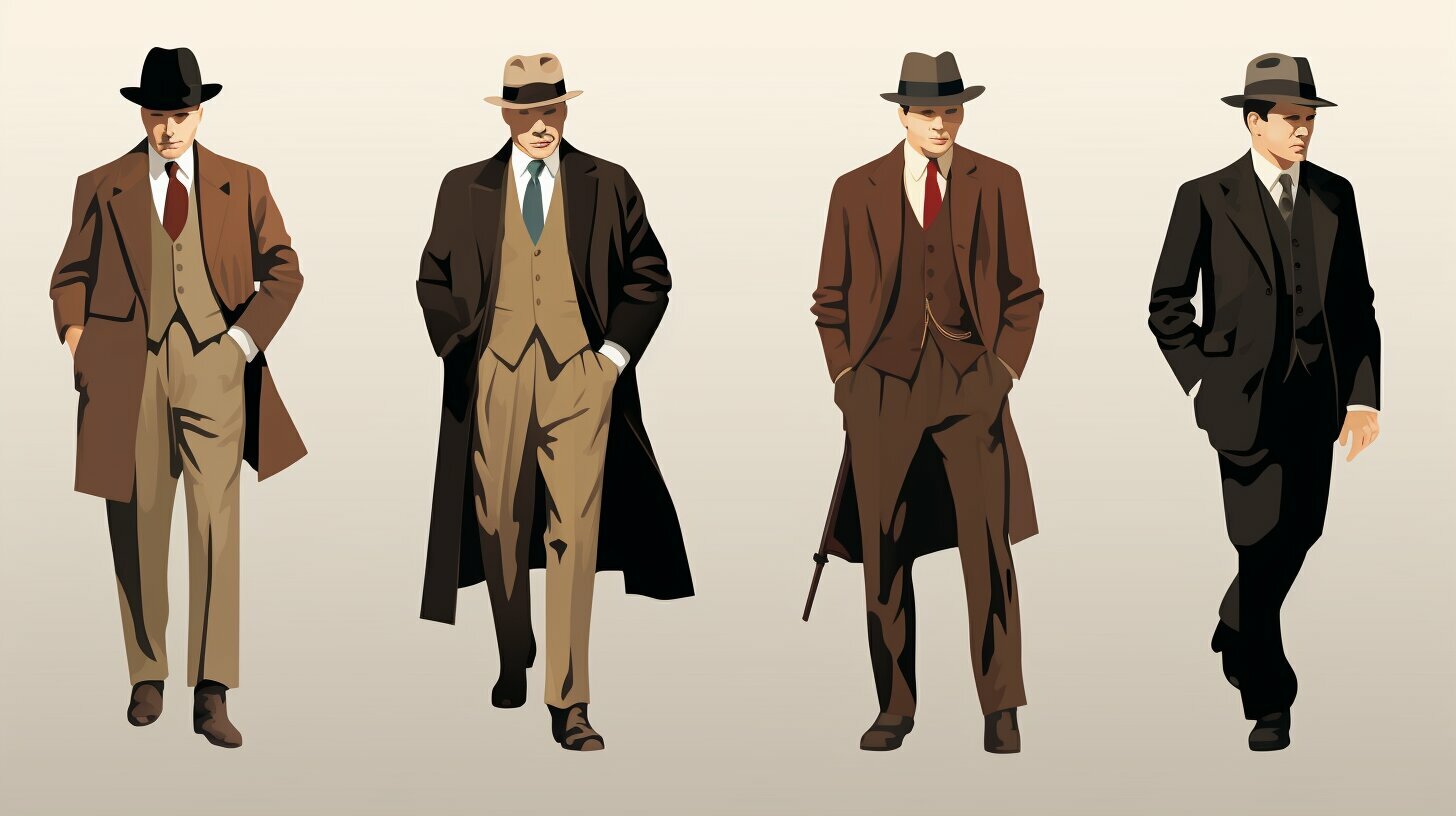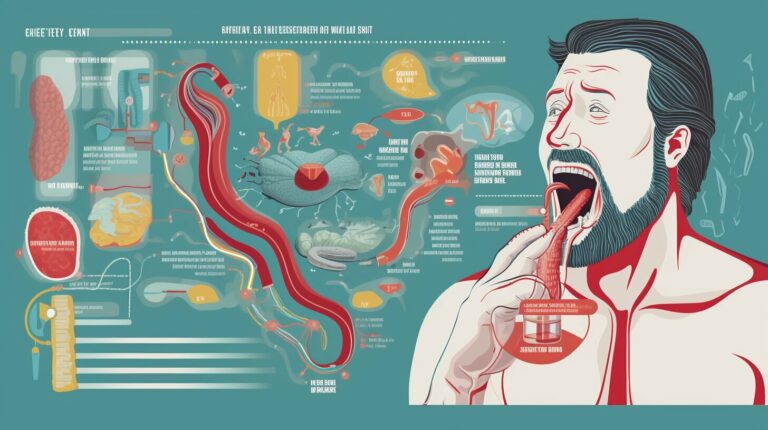Cracking the Case: Why Do Detectives Wear Suits, Anyway?
Have you ever wondered why detectives always don suits when solving crimes? It’s not just a fashion statement – there’s a method to their sartorial madness. As a professional copywriting journalist, I’m here to uncover the intriguing reasons behind this detective attire and explore its symbolism in the world of crime-solving.
Key Takeaways
- Detectives wear suits to blend in with the public and maintain a low profile during investigations.
- The tradition of detectives wearing suits dates back to the establishment of the Metropolitan Police in the UK.
- Wearing a suit helps establish a professional image and sets a boundary between the detective and the crime scene.
- Suits are tailored for functionality and safety, accommodating movement and providing storage for equipment.
- Despite the messy nature of their work, detectives prioritize looking professional and avoiding style gaffes.
Blending in and Maintaining a Low Profile
The wearing of suits serves a vital purpose in the world of detective work. It allows us to seamlessly blend in with the public, maintaining a low profile as we embark on our investigations. Unlike our uniformed counterparts, who need to be easily identifiable for emergency response, we detectives work discreetly after a crime has occurred. Our goal is to gather evidence and identify suspects without drawing unnecessary attention.
But why suits? Well, the tradition of detectives wearing suits can be traced back to the establishment of the Metropolitan Police in the UK. In the UK, detectives typically don trousers, a shirt, formal shoes, a suit jacket, and sometimes a tie. The specific uniform may vary depending on the department and the role of the detective. In the US, detectives also opt for suits or more casual attire, depending on their job. However, the underlying emphasis remains the same – maintaining a professional appearance.
Wearing a suit does more than just make us look sharp. It helps establish a professional image and creates a clear boundary between us and the crime scene. When we arrive at a crime scene, our attire conveys that we are experts, here to investigate and bring justice. It sets a tone that demands respect and cooperation from those involved. We detectives often rely on talented tailors to ensure our suits are properly fitted, allowing us to move comfortably and discreetly carry our weapons and equipment.
Personal safety is also a crucial consideration when it comes to our attire. That’s why we favor side-vented and big-shouldered suits that accommodate movement and provide ample room for storing essential gear. Our work can be messy, but we prioritize looking professional and avoiding any style gaffes that might undermine our authority. After all, a detective’s appearance can make a lasting first impression, and we want that impression to be one of competence and professionalism.
| Suit Features | Benefits |
|---|---|
| Proper tailoring | Comfort and functionality |
| Side-vented and big-shouldered design | Allows for movement and storage of gear |
| Professional appearance | Establishes authority and boundary at crime scenes |
In conclusion, the wearing of suits by detectives serves a crucial purpose in our line of work. It allows us to blend in with the public, maintain a low profile, and gather evidence discreetly. The tradition of wearing suits dates back to the establishment of the Metropolitan Police in the UK, and it remains a symbol of professionalism and expertise today. So the next time you see a detective in a sharp suit, remember that there’s more to it than just style – it’s a necessary tool in our crime-solving arsenal.
A Tradition Rooted in History
The tradition of detectives donning suits dates back to the early days of law enforcement. In the UK, it can be traced back to the establishment of the Metropolitan Police, where detectives began wearing suits to distinguish themselves from uniformed officers. This tradition has continued over the years, with detectives in the UK typically sporting trousers, a shirt, formal shoes, a suit jacket, and sometimes a tie. The specific uniform may vary depending on the department and the role of the detective.
Distinctive attire for distinguished work
The significance of detective clothing extends beyond simply establishing a professional appearance. By wearing a suit, detectives create a visual distinction that sets them apart from the general public and other law enforcement personnel. This distinction not only helps in identifying them during investigations but also conveys a sense of expertise and command. Detectives are often involved in complex and sensitive cases, and their attire reflects the seriousness and professionalism they bring to their work.
Furthermore, detective suits serve as a means of preserving the integrity of a crime scene. By wearing a specific uniform, detectives can clearly delineate their role in investigations, ensuring that they are seen as impartial observers rather than potential suspects. The suit becomes a symbol of authority, instilling confidence in witnesses and victims alike.
While the nature of detective work can be messy and unpredictable, detectives prioritize maintaining a professional appearance. To achieve this, they rely on skilled tailors to ensure that their suits are properly fitted. This attention to detail not only enhances their overall appearance but also enables them to comfortably carry weapons and equipment, ensuring they are always prepared for any situation that may arise.
Detectives also take into account their own safety when selecting their attire. Suits with side vents and larger shoulders are favored, as they provide room for movement and allow for the discreet storage of essential detective gear. Despite the challenges they face in the field, detectives are committed to avoiding style gaffes and presenting themselves in a manner that both inspires confidence and upholds the professionalism of their role.
| Key Points |
|---|
| The tradition of detectives wearing suits dates back to the establishment of the Metropolitan Police in the UK |
| Detective attire serves to distinguish detectives from other law enforcement personnel and signify their authority |
| The professional appearance of detectives is maintained through proper fitting and consideration of functionality and safety |
| Suit attire sets a boundary between the detective and the crime scene, positioning the detective as an impartial observer |
Professional Appearance and Boundary Setting
Looking the part is crucial for detectives to command respect and credibility. When they arrive at a crime scene or interact with witnesses and suspects, their professional appearance sets the tone for the investigation. Wearing a suit not only exudes authority but also establishes a clear boundary between the detective and the crime scene. It signifies that the detective is there to investigate, gather evidence, and bring justice, rather than being directly involved in the criminal act itself.
As detectives venture into crime scenes, they need to navigate through complex and often sensitive situations. A well-tailored suit serves as a visual reminder that they are professionals on a mission. It creates a sense of trust and reassurance among victims and witnesses who rely on detectives to solve their cases. By dressing in a manner that conveys competence and expertise, detectives inspire confidence and encourage cooperation from those involved.
However, looking professional doesn’t mean compromising functionality. Detectives, being the hands-on investigators they are, ensure that their suits are tailored for both style and practicality. Side-vented and big-shouldered suits allow for freedom of movement, ensuring that detectives can swiftly respond to dynamic situations. These suits also provide ample room for the discreet storage of essential equipment such as handcuffs, radios, and other investigative tools, allowing detectives to remain prepared while maintaining their professional appearance.
| Benefits of Professional Appearance for Detectives: |
|---|
| Create a sense of authority and credibility |
| Foster trust and cooperation from victims and witnesses |
| Establish a clear boundary between the detective and the crime scene |
| Convey competence and expertise |
| Ensure functionality and practicality |
Tailored for Functionality and Safety
Detectives go to great lengths to ensure their suits serve their functional needs. When it comes to detective attire, practicality is key. That’s why these crime-solving fashionistas often rely on tailors to ensure that their suits are not only stylish but also highly functional. After all, solving crimes requires a combination of wit, cunning, and the ability to move freely.
The suit jacket, for instance, is carefully tailored to accommodate detectives’ need to carry concealed weapons and other essential equipment. With side-vented jackets, detectives can easily access their gear without compromising their professional appearance. Additionally, big-shouldered suits provide ample room for storage, ensuring that detectives have everything they need at their fingertips.
Comfort is also a top priority for detectives, who often find themselves spending long hours on their feet or in high-pressure situations. That’s why the fabric and fit of their suits are meticulously chosen to ensure both breathability and ease of movement. With a well-fitted suit, detectives can navigate crime scenes, chase down suspects, and tackle any physical challenges that come their way.
| Functionality | Safety |
|---|---|
| Concealed weapon storage | Protection against physical harm |
| Ample storage for equipment | Easy access to essential gear |
| Comfortable and breathable fabric | Ability to move freely |
Despite the messy nature of their work, detectives prioritize looking professional and avoiding style gaffes. It’s a delicate balance between functionality and maintaining a polished appearance. But with their sharp suits, detectives can confidently enter any crime scene, assert their authority, and crack the case in style.
From the UK to the US: Adaptations in Attire
While the specifics may differ, detectives across borders understand the importance of dressing the part. In the UK, detectives typically don trousers, a shirt, formal shoes, a suit jacket, and sometimes a tie. The exact uniform may vary based on the department and the specific role of the detective. This traditional attire reflects the historical origins of the Metropolitan Police, where detectives were distinguished from uniformed officers by their suits.
In the US, detectives also recognize the significance of a professional appearance but have adapted their attire to suit their specific needs. Depending on their job, detectives in the US may wear suits or more casual attire that aligns with their investigative work. The emphasis, however, remains on projecting a polished and authoritative image.
While detectives in both countries prioritize looking the part, they also understand the practical aspects of their clothing choices. Proper tailoring is essential to ensure comfort and functionality, especially when it comes to carrying weapons and equipment. Side-vented and big-shouldered suits are favored to accommodate movement and provide room for storing gear. After all, being a detective requires agility and the ability to respond swiftly to any situation.
| UK Detectives | US Detectives |
|---|---|
| Formal suits with trousers, shirt, formal shoes, and jacket | Both suits and more casual attire depending on the job |
| Sometimes wear a tie | Emphasis on maintaining a professional appearance |
| Reflects the historical tradition of the Metropolitan Police | Adapted to suit the specific needs of the US context |
Despite the messy nature of their work, detectives in both the UK and the US prioritize looking professional and avoiding style gaffes. Their attire not only allows them to blend in with the public and maintain a low profile but also establishes their authority and expertise. So, whether it’s in a bustling street in London or on the busy sidewalks of New York City, you can be sure that detectives dressed in their well-tailored suits are hot on the trail of justice.
Conclusion
The choice to wear suits is more than just a fashion statement for detectives; it is an integral part of their profession. The purpose of detective suits goes beyond mere aesthetics and serves practical and symbolic functions that aid detectives in their investigative work.
Detectives wear suits to blend in with the public and maintain a low profile during investigations. Unlike uniformed police officers who need to be easily identifiable for emergency response, detectives work after a crime has occurred and need to remain inconspicuous to gather evidence and identify suspects.
The tradition of detectives wearing suits dates back to the establishment of the Metropolitan Police in the UK. In the UK, detectives typically wear trousers, a shirt, formal shoes, a suit jacket, and sometimes a tie. The uniform may vary depending on the department and the specific role of the detective. In the US, detectives also wear suits or more casual attire depending on their job, but the emphasis is still on maintaining a professional appearance.
Wearing a suit can establish a professional image and set a boundary between the detective and the crime scene. Detectives often rely on tailors to ensure their suits are properly fitted and allow for the comfortable carrying of weapons and equipment. Personal safety is also a consideration, with side-vented and big-shouldered suits being favored to accommodate movement and give room for storing gear. Despite the messy nature of their work, detectives prioritize looking professional and avoiding style gaffes.
FAQ
Why do detectives wear suits?
Detectives wear suits to blend in with the public and maintain a low profile during investigations. The choice of attire allows them to go unnoticed and gather crucial evidence discreetly.
What is the historical significance of detectives wearing suits?
The tradition of detectives wearing suits dates back to the establishment of the Metropolitan Police in the UK. It is a cultural symbol that distinguishes detectives from uniformed officers and highlights their expertise in solving crimes.
How does wearing a suit help establish a professional appearance for detectives?
Wearing a suit sets a boundary between the detective and the crime scene, conveying a sense of authority and command. It establishes a professional image and helps detectives project an air of professionalism in their work.
How do detectives ensure their suits are functional and safe?
Detectives often rely on tailors to ensure their suits are properly fitted and allow for the comfortable carrying of weapons and equipment. Side-vented and big-shouldered suits are favored to accommodate movement and provide room for storing gear.
Do detectives in the UK and the US have different attire?
While there may be variations depending on jurisdiction and department, both detectives in the UK and the US prioritize maintaining a professional appearance. The specifics of their attire may differ, but the emphasis on looking professional remains the same.






